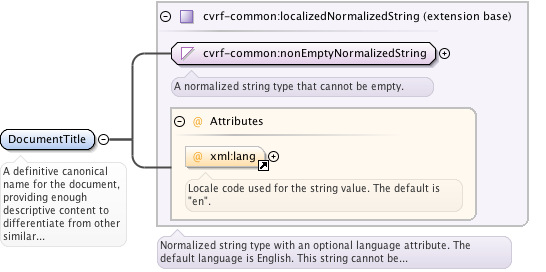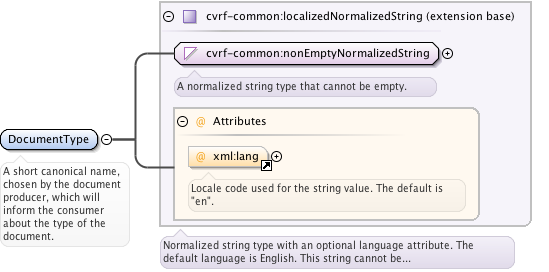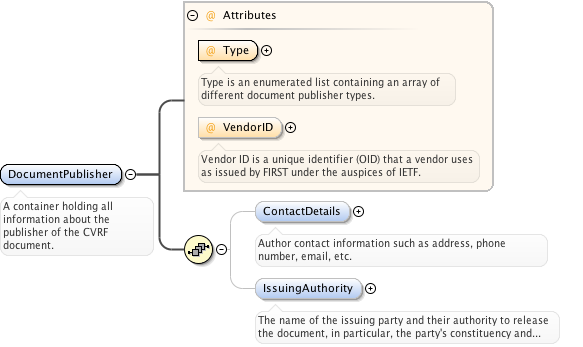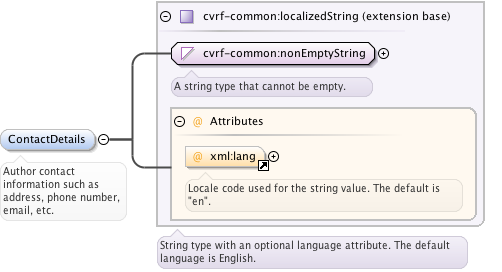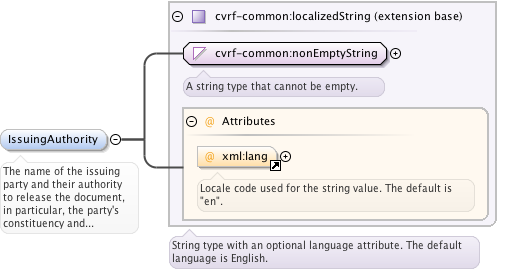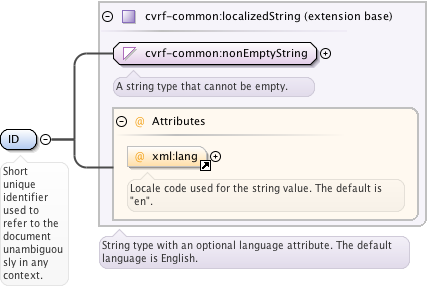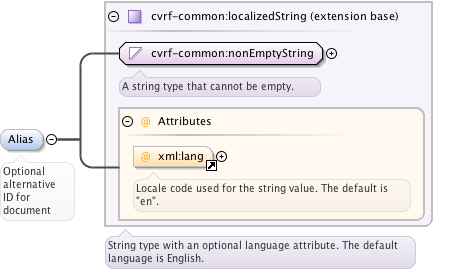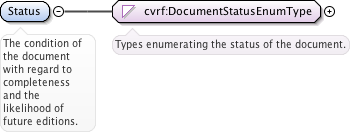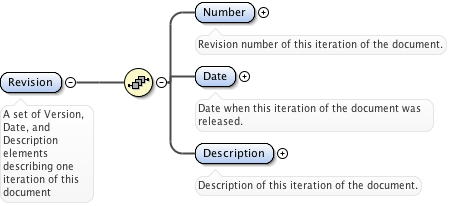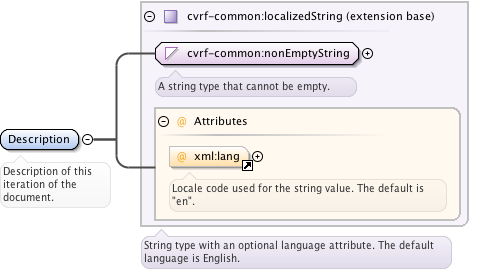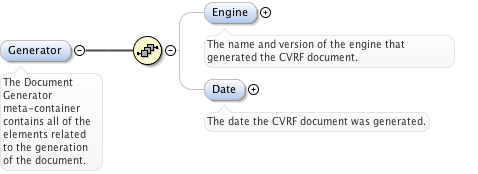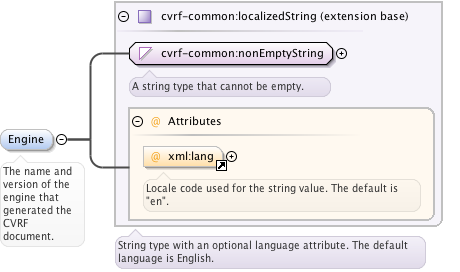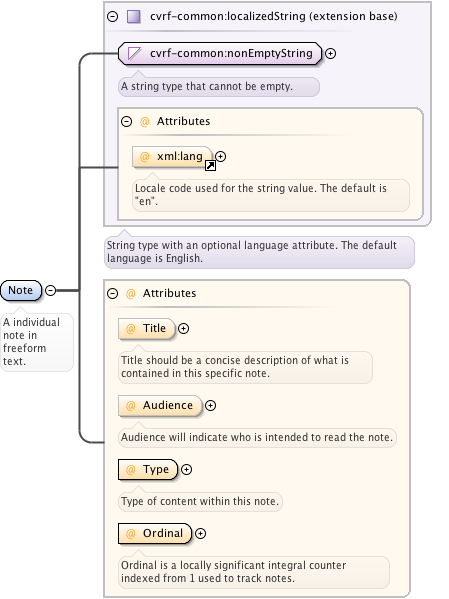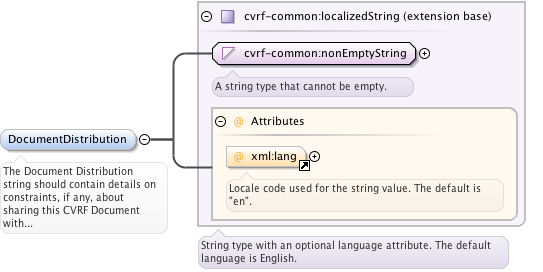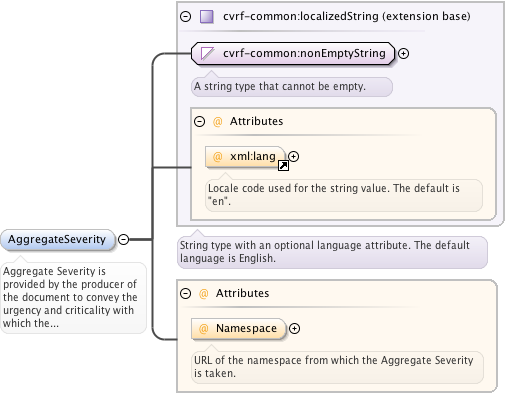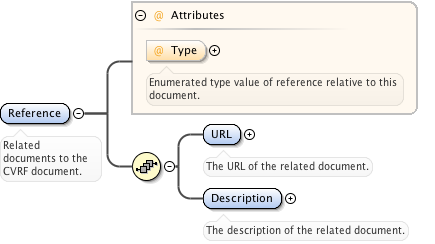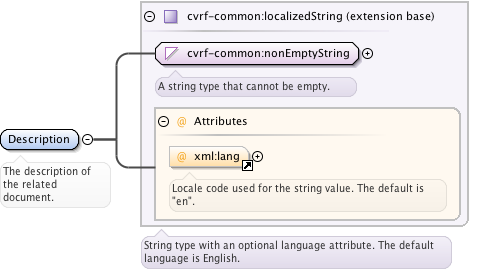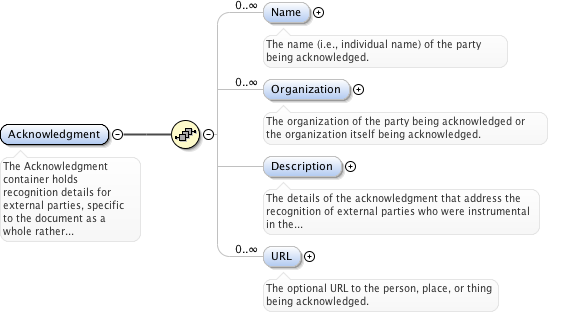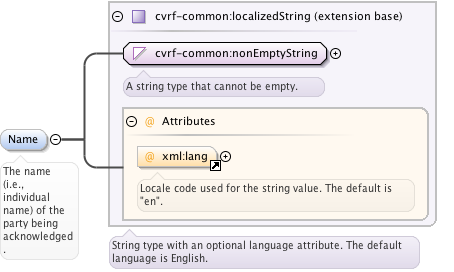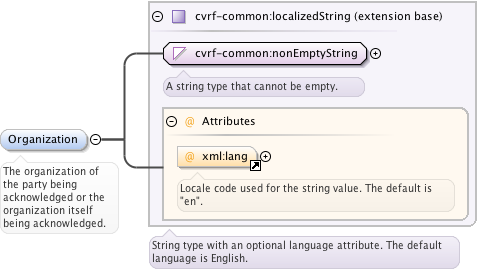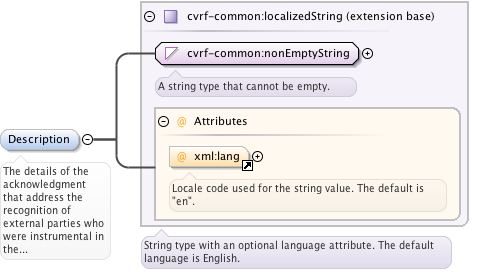<xs:element name="cvrfdoc">
<xs:annotation>
<xs:documentation xml:lang="en">Root element of a CVRF document.</xs:documentation>
</xs:annotation>
<xs:complexType>
<xs:sequence>
<xs:element name="DocumentTitle" minOccurs="1" maxOccurs="1">
<xs:annotation>
<xs:documentation xml:lang="en">A definitive canonical name for the document, providing enough descriptive content to differentiate from other similar documents, ideally providing a unique “handle”.</xs:documentation>
</xs:annotation>
<xs:complexType>
<xs:simpleContent>
<xs:extension base="cvrf-common:localizedNormalizedString"/>
</xs:simpleContent>
</xs:complexType>
</xs:element>
<xs:element name="DocumentType" minOccurs="1" maxOccurs="1">
<xs:annotation>
<xs:documentation xml:lang="en">A short canonical name, chosen by the document producer, which will inform the consumer about the type of the document.</xs:documentation>
</xs:annotation>
<xs:complexType>
<xs:simpleContent>
<xs:extension base="cvrf-common:localizedNormalizedString"/>
</xs:simpleContent>
</xs:complexType>
</xs:element>
<xs:element name="DocumentPublisher" minOccurs="1" maxOccurs="1">
<xs:annotation>
<xs:documentation xml:lang="en">A container holding all information about the publisher of the CVRF document.</xs:documentation>
</xs:annotation>
<xs:complexType>
<xs:sequence>
<xs:element name="ContactDetails" minOccurs="0" maxOccurs="1">
<xs:annotation>
<xs:documentation xml:lang="en">Author contact information such as address, phone number, email, etc.</xs:documentation>
</xs:annotation>
<xs:complexType>
<xs:simpleContent>
<xs:extension base="cvrf-common:localizedString"/>
</xs:simpleContent>
</xs:complexType>
</xs:element>
<xs:element name="IssuingAuthority" minOccurs="0" maxOccurs="1">
<xs:annotation>
<xs:documentation xml:lang="en">The name of the issuing party and their authority to release the document, in particular, the party's constituency and responsibilities or other obligations.</xs:documentation>
</xs:annotation>
<xs:complexType>
<xs:simpleContent>
<xs:extension base="cvrf-common:localizedString"/>
</xs:simpleContent>
</xs:complexType>
</xs:element>
</xs:sequence>
<xs:attribute name="Type" type="cvrf-common:PublisherEnumType" use="required">
<xs:annotation>
<xs:documentation xml:lang="en">Type is an enumerated list containing an array of different document publisher types.</xs:documentation>
</xs:annotation>
</xs:attribute>
<xs:attribute name="VendorID" type="xs:string">
<xs:annotation>
<xs:documentation xml:lang="en">Vendor ID is a unique identifier (OID) that a vendor uses as issued by FIRST under the auspices of IETF.</xs:documentation>
</xs:annotation>
</xs:attribute>
</xs:complexType>
</xs:element>
<xs:element name="DocumentTracking" minOccurs="1" maxOccurs="1">
<xs:annotation>
<xs:documentation xml:lang="en">The Document Tracking meta-container contains all of the attributes necessary to track a CVRF document.</xs:documentation>
</xs:annotation>
<xs:complexType>
<xs:sequence>
<xs:element name="Identification" minOccurs="1" maxOccurs="1">
<xs:annotation>
<xs:documentation xml:lang="en">Contains document ID and optional document aliases</xs:documentation>
</xs:annotation>
<xs:complexType>
<xs:sequence>
<xs:element name="ID" minOccurs="1" maxOccurs="1">
<xs:annotation>
<xs:documentation xml:lang="en">Short unique identifier used to refer to the document unambiguously in any context.</xs:documentation>
</xs:annotation>
<xs:complexType>
<xs:simpleContent>
<xs:extension base="cvrf-common:localizedString"/>
</xs:simpleContent>
</xs:complexType>
</xs:element>
<xs:element name="Alias" minOccurs="0" maxOccurs="unbounded">
<xs:annotation>
<xs:documentation xml:lang="en">Optional alternative ID for document</xs:documentation>
</xs:annotation>
<xs:complexType>
<xs:simpleContent>
<xs:extension base="cvrf-common:localizedString"/>
</xs:simpleContent>
</xs:complexType>
</xs:element>
</xs:sequence>
</xs:complexType>
</xs:element>
<xs:element name="Status" type="cvrf:DocumentStatusEnumType" minOccurs="1" maxOccurs="1">
<xs:annotation>
<xs:documentation xml:lang="en">The condition of the document with regard to completeness and the likelihood of future editions.</xs:documentation>
</xs:annotation>
</xs:element>
<xs:element name="Version" type="cvrf-common:revisionNumber" minOccurs="1" maxOccurs="1">
<xs:annotation>
<xs:documentation xml:lang="en">Document Version is a simple counter to track the version of the document.</xs:documentation>
</xs:annotation>
</xs:element>
<xs:element name="RevisionHistory" minOccurs="1" maxOccurs="1">
<xs:annotation>
<xs:documentation xml:lang="en">The Document Revision History contains one entry for each substantive version of the document, including the initial version and entries for each subsequent update.</xs:documentation>
</xs:annotation>
<xs:complexType>
<xs:sequence>
<xs:element name="Revision" minOccurs="1" maxOccurs="unbounded">
<xs:annotation>
<xs:documentation xml:lang="en">A set of Version, Date, and Description elements describing one iteration of this document</xs:documentation>
</xs:annotation>
<xs:complexType>
<xs:sequence>
<xs:element name="Number" type="cvrf-common:revisionNumber" minOccurs="1" maxOccurs="1">
<xs:annotation>
<xs:documentation xml:lang="en">Revision number of this iteration of the document.</xs:documentation>
</xs:annotation>
</xs:element>
<xs:element name="Date" type="xs:dateTime" minOccurs="1" maxOccurs="1">
<xs:annotation>
<xs:documentation xml:lang="en">Date when this iteration of the document was released.</xs:documentation>
</xs:annotation>
</xs:element>
<xs:element name="Description" minOccurs="1" maxOccurs="1">
<xs:annotation>
<xs:documentation xml:lang="en">Description of this iteration of the document.</xs:documentation>
</xs:annotation>
<xs:complexType>
<xs:simpleContent>
<xs:extension base="cvrf-common:localizedString"/>
</xs:simpleContent>
</xs:complexType>
</xs:element>
</xs:sequence>
</xs:complexType>
</xs:element>
</xs:sequence>
</xs:complexType>
</xs:element>
<xs:element name="InitialReleaseDate" type="xs:dateTime" minOccurs="1" maxOccurs="1">
<xs:annotation>
<xs:documentation xml:lang="en">The initial date (and time, optionally) that the document was initially released by the issuing party.</xs:documentation>
</xs:annotation>
</xs:element>
<xs:element name="CurrentReleaseDate" type="xs:dateTime" minOccurs="1" maxOccurs="1">
<xs:annotation>
<xs:documentation xml:lang="en">The current date (and time, optionally) that the document was released by the issuing party.</xs:documentation>
</xs:annotation>
</xs:element>
<xs:element name="Generator" minOccurs="0" maxOccurs="1">
<xs:annotation>
<xs:documentation xml:lang="en">The Document Generator meta-container contains all of the elements related to the generation of the document.</xs:documentation>
</xs:annotation>
<xs:complexType>
<xs:sequence>
<xs:element name="Engine" minOccurs="0" maxOccurs="1">
<xs:annotation>
<xs:documentation xml:lang="en">The name and version of the engine that generated the CVRF document.</xs:documentation>
</xs:annotation>
<xs:complexType>
<xs:simpleContent>
<xs:extension base="cvrf-common:localizedString"/>
</xs:simpleContent>
</xs:complexType>
</xs:element>
<xs:element name="Date" type="xs:dateTime" minOccurs="0" maxOccurs="1">
<xs:annotation>
<xs:documentation xml:lang="en">The date the CVRF document was generated.</xs:documentation>
</xs:annotation>
</xs:element>
</xs:sequence>
</xs:complexType>
</xs:element>
</xs:sequence>
</xs:complexType>
</xs:element>
<xs:element name="DocumentNotes" minOccurs="0" maxOccurs="1">
<xs:annotation>
<xs:documentation xml:lang="en">The Document Notes text contains all of the individual notes necessary to provide different types of low-level discussions of a CVRF document to various audiences.</xs:documentation>
</xs:annotation>
<xs:complexType>
<xs:sequence>
<xs:element name="Note" minOccurs="1" maxOccurs="unbounded">
<xs:annotation>
<xs:documentation xml:lang="en">A individual note in freeform text.</xs:documentation>
</xs:annotation>
<xs:complexType>
<xs:simpleContent>
<xs:extension base="cvrf-common:localizedString">
<xs:attribute name="Title" type="xs:string">
<xs:annotation>
<xs:documentation xml:lang="en">Title should be a concise description of what is contained in this specific note.</xs:documentation>
</xs:annotation>
</xs:attribute>
<xs:attribute name="Audience" type="xs:string">
<xs:annotation>
<xs:documentation xml:lang="en">Audience will indicate who is intended to read the note.</xs:documentation>
</xs:annotation>
</xs:attribute>
<xs:attribute name="Type" type="cvrf-common:NoteTypeEnumType" use="required">
<xs:annotation>
<xs:documentation xml:lang="en">Type of content within this note.</xs:documentation>
</xs:annotation>
</xs:attribute>
<xs:attribute name="Ordinal" type="xs:positiveInteger" use="required">
<xs:annotation>
<xs:documentation xml:lang="en">Ordinal is a locally significant integral counter indexed from 1 used to track notes.</xs:documentation>
</xs:annotation>
</xs:attribute>
</xs:extension>
</xs:simpleContent>
</xs:complexType>
</xs:element>
</xs:sequence>
</xs:complexType>
</xs:element>
<xs:element name="DocumentDistribution" minOccurs="0" maxOccurs="1">
<xs:annotation>
<xs:documentation xml:lang="en">The Document Distribution string should contain details on constraints, if any, about sharing this CVRF Document with additional recipients.</xs:documentation>
</xs:annotation>
<xs:complexType>
<xs:simpleContent>
<xs:extension base="cvrf-common:localizedString"/>
</xs:simpleContent>
</xs:complexType>
</xs:element>
<xs:element name="AggregateSeverity" minOccurs="0" maxOccurs="1">
<xs:annotation>
<xs:documentation xml:lang="en">Aggregate Severity is provided by the producer of the document to convey the urgency and criticality with which the vulnerability or vulnerabilities should be addressed.</xs:documentation>
</xs:annotation>
<xs:complexType>
<xs:simpleContent>
<xs:extension base="cvrf-common:localizedString">
<xs:attribute name="Namespace" type="xs:anyURI">
<xs:annotation>
<xs:documentation xml:lang="en">URL of the namespace from which the Aggregate Severity is taken.</xs:documentation>
</xs:annotation>
</xs:attribute>
</xs:extension>
</xs:simpleContent>
</xs:complexType>
</xs:element>
<xs:element name="DocumentReferences" minOccurs="0" maxOccurs="1">
<xs:annotation>
<xs:documentation xml:lang="en">This meta-container should include references to any conferences, papers, advisories, and other resources that are related and considered to be of value to the document consumer.</xs:documentation>
</xs:annotation>
<xs:complexType>
<xs:sequence>
<xs:element name="Reference" minOccurs="1" maxOccurs="unbounded">
<xs:annotation>
<xs:documentation xml:lang="en">Related documents to the CVRF document.</xs:documentation>
</xs:annotation>
<xs:complexType>
<xs:sequence>
<xs:element name="URL" type="xs:anyURI" minOccurs="1" maxOccurs="1">
<xs:annotation>
<xs:documentation xml:lang="en">The URL of the related document.</xs:documentation>
</xs:annotation>
</xs:element>
<xs:element name="Description" minOccurs="1" maxOccurs="1">
<xs:annotation>
<xs:documentation xml:lang="en">The description of the related document.</xs:documentation>
</xs:annotation>
<xs:complexType>
<xs:simpleContent>
<xs:extension base="cvrf-common:localizedString"/>
</xs:simpleContent>
</xs:complexType>
</xs:element>
</xs:sequence>
<xs:attribute name="Type" type="cvrf-common:ReferenceTypeEnum" default="External">
<xs:annotation>
<xs:documentation xml:lang="en">Enumerated type value of reference relative to this document.</xs:documentation>
</xs:annotation>
</xs:attribute>
</xs:complexType>
</xs:element>
</xs:sequence>
</xs:complexType>
</xs:element>
<xs:element name="Acknowledgments" minOccurs="0" maxOccurs="1">
<xs:annotation>
<xs:documentation xml:lang="en">The Acknowledgments container holds one or more Acknowledgement containers for document-level acknowledgements.</xs:documentation>
</xs:annotation>
<xs:complexType>
<xs:sequence>
<xs:element name="Acknowledgment" minOccurs="1" maxOccurs="unbounded">
<xs:annotation>
<xs:documentation xml:lang="en">The Acknowledgment container holds recognition details for external parties, specific to the document as a whole rather than individual vulnerabilities.</xs:documentation>
</xs:annotation>
<xs:complexType>
<xs:sequence>
<xs:element name="Name" minOccurs="0" maxOccurs="unbounded">
<xs:annotation>
<xs:documentation xml:lang="en">The name (i.e., individual name) of the party being acknowledged.</xs:documentation>
</xs:annotation>
<xs:complexType>
<xs:simpleContent>
<xs:extension base="cvrf-common:localizedString"/>
</xs:simpleContent>
</xs:complexType>
</xs:element>
<xs:element name="Organization" minOccurs="0" maxOccurs="unbounded">
<xs:annotation>
<xs:documentation xml:lang="en">The organization of the party being acknowledged or the organization itself being acknowledged.</xs:documentation>
</xs:annotation>
<xs:complexType>
<xs:simpleContent>
<xs:extension base="cvrf-common:localizedString"/>
</xs:simpleContent>
</xs:complexType>
</xs:element>
<xs:element name="Description" minOccurs="0" maxOccurs="1">
<xs:annotation>
<xs:documentation xml:lang="en">The details of the acknowledgment that address the recognition of external parties who were instrumental in the discovery, reporting and response of this document.</xs:documentation>
</xs:annotation>
<xs:complexType>
<xs:simpleContent>
<xs:extension base="cvrf-common:localizedString"/>
</xs:simpleContent>
</xs:complexType>
</xs:element>
<xs:element name="URL" type="xs:anyURI" minOccurs="0" maxOccurs="unbounded">
<xs:annotation>
<xs:documentation xml:lang="en">The optional URL to the person, place, or thing being acknowledged.</xs:documentation>
</xs:annotation>
</xs:element>
</xs:sequence>
</xs:complexType>
</xs:element>
</xs:sequence>
</xs:complexType>
</xs:element>
<xs:element ref="prod:ProductTree" minOccurs="0" maxOccurs="1"/>
<xs:element ref="vuln:Vulnerability" minOccurs="0" maxOccurs="unbounded"/>
</xs:sequence>
</xs:complexType>
<xs:unique name="UniqueOrdinal">
<xs:annotation>
<xs:documentation xml:lang="en">This is to ensure that each Vulnerability's Ordinal uses a unique value.</xs:documentation>
</xs:annotation>
<xs:selector xpath=".//vuln:Vulnerability"/>
<xs:field xpath="@Ordinal"/>
</xs:unique>
<xs:unique name="UniqueNotesOrdinal">
<xs:annotation>
<xs:documentation xml:lang="en">This is to ensure that each note has a unique ordinal value.</xs:documentation>
</xs:annotation>
<xs:selector xpath=".//cvrf:DocumentNotes/cvrf:Note"/>
<xs:field xpath="@Ordinal"/>
</xs:unique>
<xs:key name="ProductKey">
<xs:annotation>
<xs:documentation xml:lang="en">A key to reference a specific product defined in a referenced product schema.</xs:documentation>
</xs:annotation>
<xs:selector xpath=".//prod:FullProductName"/>
<xs:field xpath="@ProductID"/>
</xs:key>
<xs:keyref name="AffectedProductKeyRef" refer="cvrf:ProductKey">
<xs:annotation>
<xs:documentation xml:lang="en">An instance of the ProductKey to be used in the ProductID element for affected products.</xs:documentation>
</xs:annotation>
<xs:selector xpath=".//vuln:ProductStatuses/vuln:Status/vuln:ProductID"/>
<xs:field xpath="."/>
</xs:keyref>
<xs:keyref name="ScoreSetProductKeyRef" refer="cvrf:ProductKey">
<xs:annotation>
<xs:documentation xml:lang="en">An instance of the ProductKey to be used in the CVSS ScoreSet product references.</xs:documentation>
</xs:annotation>
<xs:selector xpath=".//vuln:CVSSScoreSets/vuln:ScoreSet/vuln:ProductID"/>
<xs:field xpath="."/>
</xs:keyref>
<xs:keyref name="ThreatProductKeyRef" refer="cvrf:ProductKey">
<xs:annotation>
<xs:documentation xml:lang="en">An instance of the ProductKey to be used in the Threat product references.</xs:documentation>
</xs:annotation>
<xs:selector xpath=".//vuln:Threats/vuln:Threat/vuln:ProductID"/>
<xs:field xpath="."/>
</xs:keyref>
<xs:keyref name="RemediationProductKeyRef" refer="cvrf:ProductKey">
<xs:annotation>
<xs:documentation xml:lang="en">An instance of the ProductKey to be used in the Remediation product references.</xs:documentation>
</xs:annotation>
<xs:selector xpath=".//vuln:Remediations/vuln:Remediation/vuln:ProductID"/>
<xs:field xpath="."/>
</xs:keyref>
<xs:key name="GroupKey">
<xs:annotation>
<xs:documentation xml:lang="en">A key to reference a specific product group defined in a referenced product schema.</xs:documentation>
</xs:annotation>
<xs:selector xpath=".//prod:ProductGroups/prod:Group"/>
<xs:field xpath="@GroupID"/>
</xs:key>
<xs:keyref name="ThreatGroupKeyRef" refer="cvrf:GroupKey">
<xs:annotation>
<xs:documentation xml:lang="en">An instance of the GroupKey to be used in the Threat product references.</xs:documentation>
</xs:annotation>
<xs:selector xpath=".//vuln:Threats/vuln:Threat/vuln:GroupID"/>
<xs:field xpath="."/>
</xs:keyref>
<xs:keyref name="RemediationGroupKeyRef" refer="cvrf:GroupKey">
<xs:annotation>
<xs:documentation xml:lang="en">An instance of the GroupKey to be used in the Remediation product references.</xs:documentation>
</xs:annotation>
<xs:selector xpath=".//vuln:Remediations/vuln:Remediation/vuln:GroupID"/>
<xs:field xpath="."/>
</xs:keyref>
</xs:element> |

